Category Archives: Data Science
Normal Distribution Explained with Python Examples
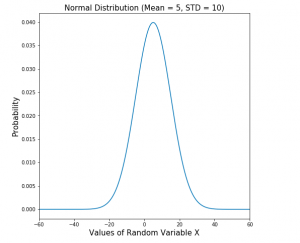
What is normal distribution? It’s a probability distribution that occurs in many real world cases. In this blog post, you will learn about the concepts of Normal Distribution with the help of Python example. As a data scientist, you must get a good understanding of different probability distributions in statistics in order to understand the data in a better manner. Normal distribution is also called as Gaussian distribution or Laplace-Gauss distribution. Normal Distribution with Python Example Normal distribution is the default probability for many real-world scenarios. It represents a symmetric distribution where most of the observations cluster around the central peak called as mean of the distribution. A normal distribution can be thought of as a …
Tensor Broadcasting Explained with Examples
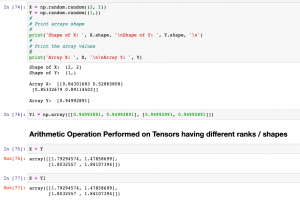
In this post, you will learn about the concepts of Tensor Broadcasting with the help of Python Numpy examples. Recall that Tensor is defined as the container of data (primarily numerical) most fundamental data structure used in Keras and Tensorflow. You may want to check out a related article on Tensor – Tensor explained with Python Numpy examples. Broadcasting of tensor is borrowed from Numpy broadcasting. Broadcasting is a technique used for performing arithmetic operations between Numpy arrays / Tensors having different shapes. In this technique, the following is done: As a first step, expand one or both arrays by copying elements appropriately so that after this transformation, the two tensors have the …
Regularization in Machine Learning: Concepts & Examples
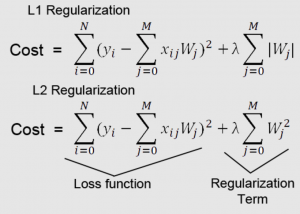
In machine learning, regularization is a technique used to avoid overfitting. This occurs when a model learns the training data too well and therefore performs poorly on new data. Regularization helps to reduce overfitting by adding constraints to the model-building process. As data scientists, it is of utmost importance that we learn thoroughly about the regularization concepts to build better machine learning models. In this blog post, we will discuss the concept of regularization and provide examples of how it can be used in practice. What is regularization and how does it work? Regularization in machine learning represents strategies that are used to reduce the generalization or test error of …
Frequentist vs Bayesian Probability: Difference, Examples
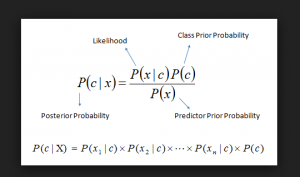
In this post, you will learn about the difference between Frequentist vs Bayesian Probability. It is of utmost importance to understand these concepts if you are getting started with Data Science. What is Frequentist Probability? Probability is used to represent and reason about uncertainty. It was originally developed to analyze the frequency of the events. In other words, the probability was developed as frequentist probability. The probability of occurrence of an event, when calculated as a function of the frequency of the occurrence of the event of that type, is called Frequentist Probability. Frequentist probability is a way of assigning probabilities to events that take into account how often those events actually occur. Frequentist …
SVM Classifier using Sklearn: Code Examples
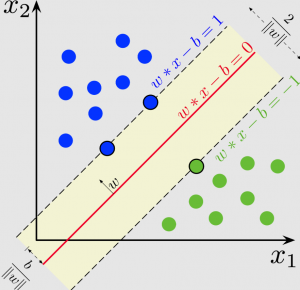
In this post, you will learn about how to train an SVM Classifier using Scikit Learn or SKLearn implementation with the help of code examples/samples. An SVM classifier, or support vector machine classifier, is a type of machine learning algorithm that can be used to analyze and classify data. A support vector machine is a supervised machine learning algorithm that can be used for both classification and regression tasks. The Support vector machine classifier works by finding the hyperplane that maximizes the margin between the two classes. The Support vector machine algorithm is also known as a max-margin classifier. Support vector machine is a powerful tool for machine learning and has been widely used …
Stochastic Gradient Descent Python Example
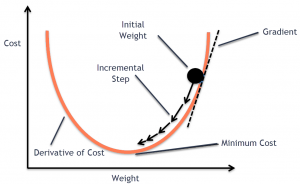
In this post, you will learn the concepts of Stochastic Gradient Descent (SGD) using a Python example. Stochastic gradient descent is an optimization algorithm that is used to optimize the cost function while training machine learning models. The most popular algorithm such as gradient descent takes a long time to converge for large datasets. This is where the variant of gradient descent such as stochastic gradient descent comes into the picture. In order to demonstrate Stochastic gradient descent concepts, the Perceptron machine learning algorithm is used. Recall that Perceptron is also called a single-layer neural network. Before getting into details, let’s quickly understand the concepts of Perceptron and the underlying learning …
Dummy Variables in Regression Models: Python, R
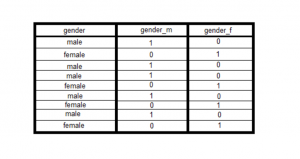
In linear regression, dummy variables are used to represent the categorical variables in the model. There are a few different ways that dummy variables can be created, and we will explore a few of them in this blog post. We will also take a look at some examples to help illustrate how dummy variables work. We will also understand concepts related to the dummy variable trap. By the end of this post, you should have a better understanding of how to use dummy variables in linear regression models. As a data scientist, it is important to understand how to use linear regression and dummy variables. What are dummy variables in …
Linear regression hypothesis testing: Concepts, Examples
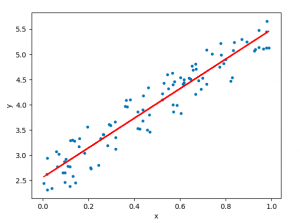
In relation to machine learning, linear regression is defined as a predictive modeling technique that allows us to build a model which can help predict continuous response variables as a function of a linear combination of explanatory or predictor variables. While training linear regression models, we need to rely on hypothesis testing in relation to determining the relationship between the response and predictor variables. In the case of the linear regression model, two types of hypothesis testing are done. They are T-tests and F-tests. In other words, there are two types of statistics that are used to assess whether linear regression models exist representing response and predictor variables. They are …
Correlation Concepts, Matrix & Heatmap using Seaborn
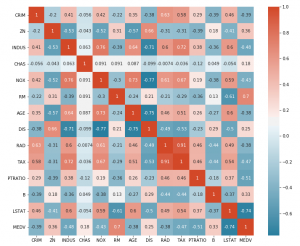
In this blog post, we’ll be discussing correlation concepts, matrix & heatmap using Seaborn. For those of you who aren’t familiar with Seaborn, it’s a library for data visualization in Python. So if you’re looking to up your data visualization game, stay tuned! We’ll start with the basics of correlation and move on to discuss how to create matrices and heatmaps with Seaborn. Let’s get started! Introduction to Correlation Correlation is a statistical measure that expresses the strength of the relationship between two variables. The two main types of correlation are positive and negative. Positive correlation occurs when two variables move in the same direction; as one increases, so do …
When to Use Which Clustering Algorithms?
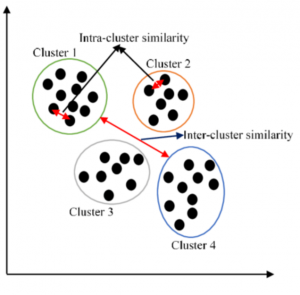
There are many clustering machine learning algorithms to choose from when you want to cluster data. But which one should you use in a particular situation? In this blog post, we will explore the different clustering algorithms and explain when each one is most appropriate. We will also provide examples so that you can see how these algorithms work in practice. What clustering is and why it’s useful Simply speaking, clustering is a technique used in machine learning to group data points together. The goal of clustering is to find natural groups, or clusters, in the data. Clustering algorithms are used to automatically find these groups. Clustering is useful because …
AI / Data Science Operating Model: Teams, Processes

Realizing value from AI/data science or machine learning projects requires the coordination of many different teams based on an appropriate operating model. If you want to build an effective AI/data science operation, you need to create a data science operating model that outlines the steps involved in how teams are structured, how data science projects are implemented, how the maturity of data science practice is evaluated and an overall governance model which is used to keep a track of data science initiatives. In this blog post, we will discuss the key components of a data science operating model and provide examples of how to optimize your data science process. AI …
Deductive & Inductive Reasoning: Examples, Differences
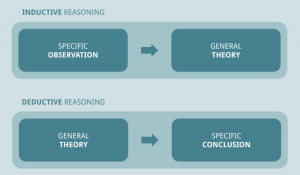
When it comes to data science, there are two main types of reasoning that you need to be familiar with: deductive and inductive. Both of these techniques are important in order to make sound decisions based on the data that you’re working with. In this blog post, we’ll take a closer look at what deductive and inductive reasoning are, what are their differences, and how they’re related to each other. What is deductive reasoning? Deductive reasoning is an important tool in data science. Deductive reasoning is the process of deriving a conclusion based on premises that are known or assumed to be true. In other words, deductive reasoning allows you …
Steps for Evaluating & Validating Time-Series Models
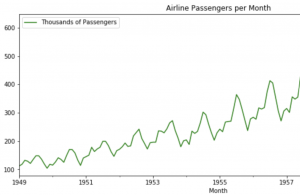
Time-series machine learning models are becoming increasingly popular due to the large volume of data that is now available. These models can be used to make predictions about future events, and they are often more accurate than traditional methods. However, it is important to properly evaluate (check accuracy by performing error analysis) and validate these models before you put them into production. In this blog post, we will discuss the different ways that you can evaluate and validate time series machine learning models. We will also provide some tips on how to improve your results. As data scientists, it is important to learn the techniques related to evaluating time-series models. …
Machine Learning with Alteryx: Examples
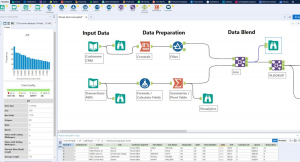
Alteryx is a self-service data analytics software platform that enables users to easily prep, blend, and analyze data all in one place. It is a powerful tool that can be used in a variety of machine learning scenarios. It can be used to clean and prepare data, and develop, evaluate and deploy machine learning (ML) models. It offers a variety of features and tools that can be used to preprocess data, choose algorithms, train models, and evaluate results. In this blog post, we will discuss some of the ways that Alteryx can be used in machine learning. We will also provide examples of how to use Alteryx in machine learning scenarios. …
Digital Transformation Strategy: What, Why & How?

Digital transformation is a digital strategy that aims to change the way an organization operates. It’s not just about digital marketing anymore – digital transformation includes all aspects of digital engagement from customer service, product development, and delivery, operations, etc. And it requires a holistic approach to digital transformation without any silos or strategic gaps in between departments. In this blog post, we will cover what digital transformation is and why organizations should take advantage of this strategy. We’ll also look at how digital transformation is happening in different industries. What is digital transformation? Digital transformation is a digital strategy that aims to change the way an organization operates and …
Business Analytics Team Structure: Roles/ Responsibilities
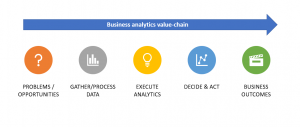
Business analytics is a business function that has been around for years, but it’s only recently gained traction as one of the most important business functions. Organizations are now realizing how business analytics can help them increase revenue and improve business operations. But before you bring on a business analytics team, you need to determine if your company needs full-time or part-time team members or both. It might seem logical to hire full-time staff members just because they’re in demand, but this isn’t always necessary. If your business operates without any external data sets and doesn’t have complex reporting and advanced analytics needs then it may be more cost-effective to …
I found it very helpful. However the differences are not too understandable for me